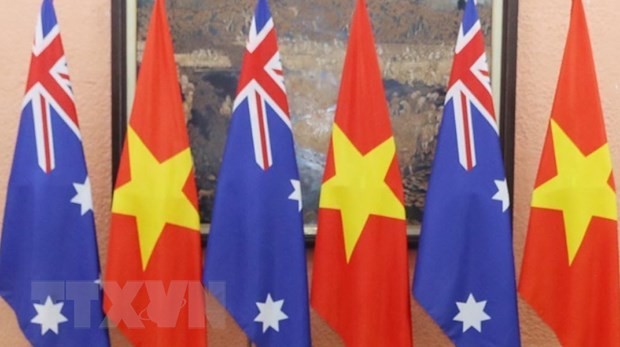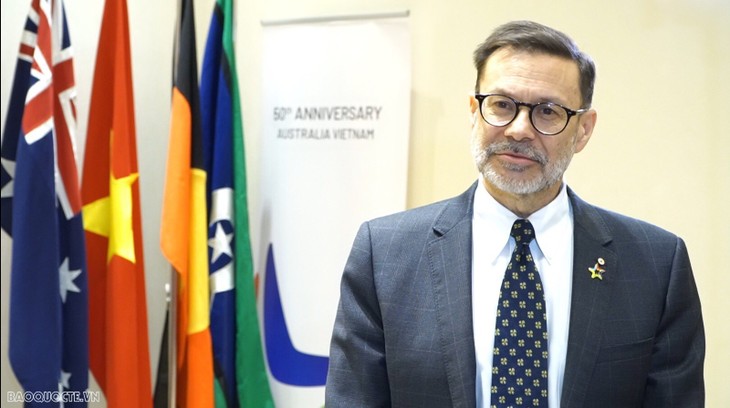(VOVWORLD) - Over the last half a century, Vietnam-Australia cooperative relations have achieved impressive results. At an international conference called "50 years of Vietnam-Australia relations: Retrospect and Prospects" in Hanoi on Tuesday, participants delivered presentations affirming that the two countries are working toward closer cooperation to meet the needs of each country and adapt to the new situation in the region and the world.
 National flags of Vietnam and Australia (photo: Trong Duc) National flags of Vietnam and Australia (photo: Trong Duc) |
On February 26, 1973, Vietnam and Australia officially established diplomatic relations. They established a comprehensive partnership in 2009 and upgraded it to a strategic partnership in 2018. Since then the two countries have acknowledged each other’s importance in external policies, security, and the economy.
Milestones in the 50-year relationship
At a conference organized by the Institute of Southeast Asian Studies at the Vietnam Academy of Social Sciences in collaboration with the Australian Embassy in Vietnam, presentations highlighted a strategic shift in international relations between the Cold War (1947-1991) and now, with countries shifting from confrontation to dialogue and promoting global economic cooperation. The Vietnam-Australia relationship has developed well, based on strong mutual trust.
 Australian Ambassador to Vietnam Andrew Goledzinowski (photo: Trong Nguyen) Australian Ambassador to Vietnam Andrew Goledzinowski (photo: Trong Nguyen) |
Australian Ambassador to Vietnam Andrew Goledzinowski said: “I can say very confidently that no time in history has our relationship been stronger than now. It’s built on mutual trust and practical cooperation across so many fields over so many years, defense, education, trade, and people to people exchange.”
Vietnam and Australia have an important position in each other's foreign policy. Australia attaches great importance to Vietnam, because Vietnam has a strategic geographical position in Southeast Asia that increasingly attracts the attention of major countries. In its foreign strategy, Australia has repeatedly affirmed that a peaceful, stable, prosperous, independent, and sovereign Indo-Pacific region cannot exist without Vietnam’s role.
Associate Professor Doctor Ta Minh Tuan, Vice Chairman of the Vietnam Academy of Social Sciences, said: “Over more than 20 years from 1991 to 2022, bilateral trade has grown rapidly from 60 million USD to 15.7 billion USD. Vietnam is the 10th largest trading partner of Australia. Australia is the 7th largest trading partner of Vietnam. Australia is also a leading provider of development aid, playing a big role in assisting Vietnam’s socio-economic development over the last decade.”
The community of Vietnamese-Australians numbers about 350,000, making it the fifth-largest foreign community in Australia. There are also 31,000 Vietnamese students and post-graduates studying in Australia. They are an important bridge of culture, trade, investment, and economic connection between the two countries.
Deepening bilateral strategic partnership
Since Vietnam and Australia upgraded their bilateral relationship to a strategic partnership in 2018, Australia has increasingly valued Vietnam's role and position in the region and the world. Both countries have huge opportunities and potential for cooperation based on their strengths. As globalization and regional connectivity increase, the Vietnam-Australia relationship is shifting to a cooperative partnership for mutual development.
Associate Professor Dr. Nguyen Huy Hoang, Director of the Institute of Southeast Asian Studies, said: The Vietnam-Australia relationship is a model of international relations, rising from partnership to strategic partnership, and possibly soon to comprehensive strategic partnership. Vietnam is hopeful that this bilateral relationship will be the foundation for peace in the Asia-Pacific and Indo-Pacific region, create opportunities for Vietnam and Australia, and help shape a new regional order.“
Over the last 5 decades, Vietnam-Australia relations have gained impressive results, which are now the foundation for an enduring win-win model of bilateral relations.